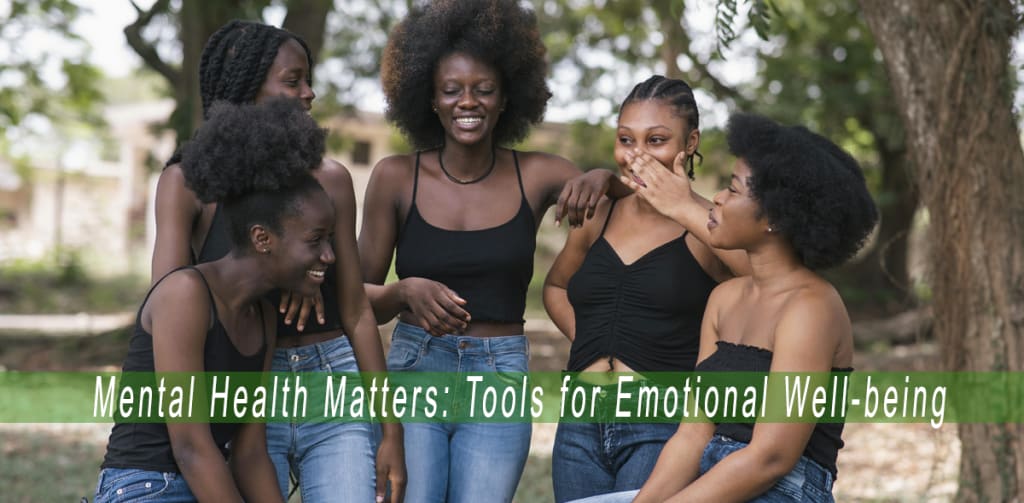Mental Health Matters: Tools for Emotional Well-being
Self-care practices and tools to enhance emotional well-being and healthy coping mechanisms.

Mental health is a rising concern, particularly among young adults, adolescents, and children. After the Covid-19 pandemic, mental health issues such as depression and anxiety disorders have increased among young people. The presence of social media and its constant messaging everywhere has also added to issues with low self-esteem and self-worth. However, by equipping ourselves and our children with the right tools and strategies, we can build resilience and a strong foundation for mental health. This article explores practical tools to enhance emotional well-being.
Developing Emotional Wellness
Resilience
Resilience is the ability to bounce back from adversity, handle challenges, and adapt to life's changes. It is not about avoiding difficulties, but rather about developing inner strength and coping mechanisms to overcome them. Resilience acts as a protective shield for our mental health. It enables us to face stress, setbacks, and hardships with confidence and determination. For young people coming of age these days, it a crucial life skill.
Self-care
This is a term that is thrown around a lot these days, and rightly so. It does not necessarily mean sitting in a bath with candles around and repeating affirmations (though it can). Self-care is a daily practice in which you make it a priority to do the things your mind and body need in order to be healthy.
Self-care can be enjoyable. Spend time with friends or family whose company enriches you. Play a sport, go for a walk, or watch a show. You can also do activities that promote relaxation such as meditation, reading, singing, or listening to music. Your mental wellbeing impacts your physical wellbeing. In the same way, your physical health has an effect on your mental health.
Self-care for young people

Often, with the pressures of academics, peer groups, family, sports, etc., young people forget to feed their souls. They do not develop the skills to recognize when they need to look after themselves. It is important for them to identify when they need a break or help. Self-care is not only for adults, young people benefit from it too. Encourage your child or teen to find what helps and what makes them feel better. Examples of self-care practices include:
- Getting the right amount of quality sleep
- Eating a nutritious diet
- Making the time for exercise
- Doing a hobby
- Spending time with friends
- Playing with a pet
- Watching a good show
- Having a nap
Coping Mechanisms
A coping mechanism is behavior we engage in in order to help us manage pressures, upsets, and challenges in our lives.
Unhealthy coping mechanisms
Unhealthy coping mechanisms are just that – engaging behaviors that are not good for us in order to deal with our problems. These include:
- Substance abuse – drugs, alcohol, cigarettes
- Isolating yourself
- Overeating or undereating
- Thinking the worst-case scenario for everything
- Overthinking and excessive worrying
- Toxic or excessive positivity
- Self-harm
Healthy coping mechanisms
Healthy coping mechanisms are strategies you use to maintain emotional wellbeing and to self-sooth. These include:
- Asking for help, from a trusted friend, family member, or a therapist
- Self-care – sleeping and eating well, exercising
- Relaxation tools – meditation, deep breathing, journaling
- Setting boundaries
- Pursuing a hobby – music, painting, reading, sports
- Engaging with a support group or other network
- Books and podcasts on wellbeing
These activities can help manage emotions, reduce anxiety, and promote a sense of calm.
Young adults will need guidance so that they can identify which work best for them. They should be taught about healthy and unhealthy coping mechanisms.
Social Support
Another important factor in nurturing our mental wellness is social connection. Research shows that loneliness can be as harmful as smoking. Make fulfilling connections with family, friends, or support groups. A strong support network will give you a sense of belonging. It will also provide resources you can turn to for help.
Positive Mindset
This is not toxic or excessive positivity. Toxic or excessive positivity is the flawed belief that no matter how awful a situation is, you should be positive and avoid any negative thoughts or possibilities. Instead, a positive mindset means identifying any patterns of negative thinking. It requires you to reassess your world view and your outlook on your life. Do you have self-limiting beliefs? Are there unhealthy thought patterns you follow on autopilot? Reflect on the ones you can put a different, less cynical spin on. Instead of only focusing on mistakes you have made, give weight to your strengths and accomplishments.
A positive mindset also involves being grateful. Immerse yourself in feelings of gratitude as a daily practice.
Stress Management
The effect of stress on our mental and physical health cannot be underestimated. Use stress management techniques to reduce the amount of pressure you feel. These include:
- deep breathing exercises
- massage
- exercise
- talking to a mental health professional
- activities that relax you and make you feel good
Getting Help from a Mental Health Professional
Young people should be encouraged to prioritize their mental health. Seeking professional help is a sign of strength. It can help you improve your own or your child’s emotional wellbeing. If persistent emotional challenges arise, a therapist will guide you through these and provide support. Treatment such as therapy for individuals, therapy for teens, and therapy for children can help improve self-esteem and outlook on life.
Everyone's journey is unique, and it is essential to find what works best for you. Trust Mental Health has a team of BIPOC therapists that are trained in a variety of treatments. We advocate for the importance of mental health. Through therapy, we help people to empower themselves and build resilience. Contact us today for a free 15 minute consultation. We offer therapy in San Jose and all over California, both in-person and online.
FAQs
How can therapy help my teen?
Therapy for teens can help your child identify and work through what they are struggling with. It will enable them to communicate their needs better and strengthen their relationships. Teen therapy also builds self-esteem, self-worth, and confidence.
What happens in therapy for children?
Child therapy provides a safe space for children to explore their difficult emotions and express their thoughts and feelings. It helps them improve emotional regulation, cognitive skills, and navigate challenges.
What is BIPOC therapy?
BIPOC therapy is inclusive, representative treatment for black, indigenous, and people of colour. A BIPOC therapist will understand your background and cultural sensitivities. Our team of therapists speak over 10 languages between them.
About the Creator
Trust Mental Health
Introducing Trust Mental Health: Your Pathway to Wellness Across California!
Trust Mental Health, your trusted companion on the journey to emotional well-being.






Comments
There are no comments for this story
Be the first to respond and start the conversation.